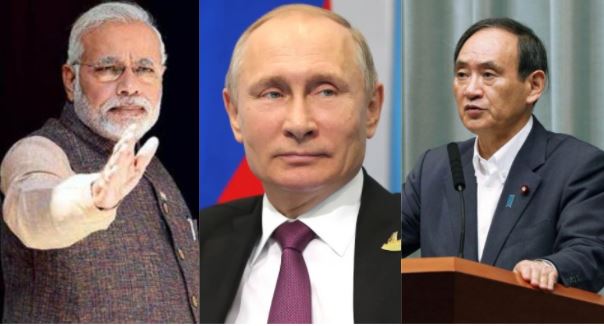China’s belligerence and hunger for the resource-rich Far East region of Russia have been well-documented by TFI, over the last few months. New Delhi, which has been a significant investor in the Far East, is now looking to take apart China once and for all by inviting Russia to come onboard with Japan and India to sink the niggling dinghy of the Communist Party of China.
According to a report in DNA, India’s External Affairs Minister Dr S Jaishankar has called for expansion of the India-Japan partnership for projects in a third country to Russia’s far east and Pacific island countries.
S Jaishankar at a FICCI virtual event said, “One is the possibility of economic cooperation in Russian far east because India has shown much greater willingness to be involved in economic projects there and the other is pacific island countries, we have developed a partnership and political footprints there.
India is a big investor in Russia’s Far East as last year, PM Modi after visiting Vladivostok had extended a $1 billion line of credit to Russia for the development of its Far East region. New Delhi is simultaneously looking to develop a sea route linking India’s Chennai with the Russian Far East city of Vladivostok that will pass through the South China Sea, securing the Russian Far East territory and at the same time needling China.
By bringing Japan on the table with Russia, India has played a diplomatic masterstroke. Russia has had some inhibitions about engaging in the Indo-Pacific where Japan and India are an integral part of the Quad and challenging Chinese hegemony.
In January, Russian foreign minister Sergey Lavrov said that the Indo-Pacific Initiative was supposed to “reconfigure the existing structures in the Asia Pacific region to move from ASEAN centered consensus-seeking forms of interaction to something that would be divisive.
However, Jaishankar’s statements come at a time when Moscow has increased its military presence in the Far-East to protect itself from a looming Chinese encroachment drive.
Reported by TFI yesterday, Russia’s Defence Minister Sergei Shoigu said that the decision had been taken because of tensions in the “eastern strategic direction”, referring to an area encompassing Russia’s eastern border with China and the wider Asia-Pacific.
The decision to increase the army numbers in the region and repeatedly asking India to chime in with the Chennai-Vladivostok sea route to thwart China’s nefarious ‘expansionist idea’ in the region should be a reason enough to understand that Moscow is indeed looking to join hands in the Indo-Pacific by ditching its earlier orthodox stance.
New Delhi is making some strong overtures to Moscow, by bringing up the trilateral concept involving India, Japan and Russia. Japan and India have been working closely to co-operate on connectivity and other major projects in the Indo-Pacific Region in locations like Bangladesh, Sri Lanka, Myanmar and even Africa.
Together, India and Japan can convince Russia that they will help a sanctions-ridden Russian economy to cut dependence on China. Currently, the proposal is only at a conceptual stage but the offer to work on joint investments and projects with India and Japan would be too tempting as an offer for the Russian President Vladimir Putin to reject.
Russia seeks India’s investment and assistance to counter Chinese presence in the sparsely populated and underdeveloped Russian Far East.
Apart from infrastructure development, Russia also wants the Indian workforce in the region to counter the demographic change sparked by Chinese businesses in the region which has a population of only about 8 million. Russia has banned permanent land transfers to Chinese investors in the region and made employment of 80 percent of local people’s population compulsory for all upcoming Chinese projects.
New Delhi has successfully found a lot of common ground in the Indo-Pacific with Russia. If Russia joins in, India will be able to play a major role in rescuing Moscow from the Western world sanctions and in turn use it as a leverage to shoo away the paper dragon in the Pacific.
